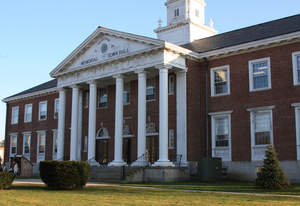Town officials take a look at next year's budget
Wareham is cash-strapped, and officials are still exploring ways to generate revenue for a town in desperate need of relief.
With a potential shortfall of $600,000 projected for next year, members of the Board of Selectmen, the School Committee and the Finance Committee met on Wednesday to discuss the realities of budgets for both fiscal years 2015 and 2016.
Some officials suggested isolating certain aspects of the failed Proposition 2 1/2 override budget that voters might support as a singular purchase. But others disagreed, saying they had to work with what the voters gave them.
"It's over for at least two years," said Selectman Peter Teitelbaum. "The citizens have to understand that we weren't fooling around when we told them things were going to be very bad when they didn't pass it."
"We have to respect what happened on June 17," he added.
On that day, the town voted 2,811 to 1,332 to not fund a $4.5 million tax increase in the form of a Proposition 2 1/2 override. As a result, 45 town employees lost their jobs on July 1 and many services in town, such as the library and the Council on Aging, saw deep cuts to service.
"The voters told us, 'Guys, get over it. Here's the money. Go do your job'," said Selectman Judith Whiteside.
Officials discussed the possibility of using a debt exclusion, which is a temporary increase to the town's tax base, to fund certain projects. The town could vote for a debt exclusion to pay costs for an individual project from the property tax levy outside of the taxes raised from Proposition 2 1/2, which says that property taxes cannot be increased by more than 2.5 percent from the previous year. The debt exclusion's costs would be added to the annual tax levy under Proposition 2 1/2 for the life of the debt only.
Town Administrator Derek Sullivan said that debt exclusions should be used for buildings, such as new schools, and are not a good idea for funding operations.
School Committee member Geoff Swett said he would support something such as a five-year debt exclusion for a school bus with a useful life of 10 years.
"I would never suggest a debt exclusion where the useful life of that item was less than what it was going to cost to pay it off," he said.
Finance Committee member Dominic Cammarano asked Sullivan if there were any other areas where the town was creating new sources of revenue, such as with the parking kiosks and the resident parking plan in Onset.
Sullivan said the kiosks and meters are projected to bring in between $100,000 and $110,000, more than the $90,000 goal he had originally hoped for. He said that money could potentially be used for things such as fixing the Onset Pier, line-painting, signage and other uses in the area.
He also said the new resident parking permit program stickers in Onset are set to bring in about $10,000 and would go into the general fund for the town, and that between those two programs, the increase of various permit fees in town and a trend of decreasing state aid, officials should not expect any "boon or windfall" in revenue.
Wareham Public Schools Business Manager Michael MacMillan said at the start of the 2015 school year that the schools will have 32 fewer positions than last year through retirements and layoffs. Superintendent Kimberly Shaver-Hood said that 18 of those positions will be teachers and the remaining 14 will come from staff such as paraprofessionals and administrators.
"Every part of the budget is being examined," MacMillan said.
Many of the officials at the meeting made it clear that although the outlook is bleak, no one is giving up on the town. They discussed the need to engage citizens in what they want from town government and to establish trust with the voters.
"We need to go from the bottom up and we need the citizens to tell us what they think, what they want and what they don't want," said Selectman Alan Slavin. "There's got to be a value for what they vote for. We have to prove a value."
Swett said that long-term competency is the key to earning the voters trust. "I think we're pretty competent right now, and I know our two executives [Sullivan and Shaver-Hood] are competent right now," he said. "But unfortunately they haven't been competent for long enough. It's going to take a longer period of competency for that distrust to start to disappear."
Officials agreed to meet again before the end of the summer to continue planning for the economic future of the town.















